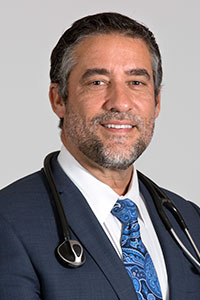Contact Us
Knowing "your numbers" is an important part of keeping your heart healthy. During a checkup, your doctor will take a careful look at your numbers, including your triglycerides, blood pressure, and cholesterol. But what exactly do these numbers mean, and why are they so important?
These key factors indicate how healthy your heart is, and help you and your doctor understand your risks and the progress that you’ve made on your path to health. The values listed below are recommended for people who don’t have underlying medical conditions.
Dr. Angel Mulkay, an interventional cardiologist at Holy Name, explained the five simple measurements that let you know how you’re doing in achieving and maintaining optimum numbers for your cardiovascular system (heart and vessels). If eating a balanced diet and exercising don’t get or keep your numbers within the ideal values, a visit to a cardiologist might be in order.
"I encourage my patients to take charge of their health by not only knowing their numbers, but understanding what they mean," Dr. Mulkay said. "We work with our patients to keep their numbers in a healthy range to dramatically decrease their risk of heart attack, stroke, or other cardiovascular conditions."
Blood Pressure
A blood pressure reading indicates how hard your heart is working to pump blood through your body and the condition of the vessels carrying that blood. It registers the force of blood pushing against the arteries when your heart contracts (top number), and when the heart relaxes, (bottom number). A healthy blood pressure is less than 120/80.
"Left untreated, high blood pressure damages blood vessels, which can lead to a buildup of fatty plaque," Dr. Mulkay said. "This is an ideal setting for a heart attack and raises the risk of stroke."
Blood Sugar
Diabetes is a condition in which there is too much sugar in your blood. Type 2, the most common form of diabetes, occurs when the body develops resistance to insulin or doesn’t produce enough of it. Insulin helps move sugar from your blood into your cells, to be used for energy or to store it for later use. Blood with excess sugar is more likely to form clots, leading to a heart attack or stroke.
To help keep your blood sugar in check, avoid sugary beverages and foods high in sugar, such as white flour and white rice. Your blood sugar should be less than 100.
LDL Cholesterol
Cholesterol is a fat-like substance found in the body’s cells. It’s needed to build more cells and make hormones. Low-density lipoprotein cholesterol (LDL), commonly referred to as bad cholesterol, makes up the majority of your cholesterol. Too much LDL, and it will attach to artery walls, preventing blood from flowing freely and creating the conditions for a stroke or heart attack. LDL should be less than 100.
Triglycerides
Triglycerides are a type of fat in your blood. They are created with excess calories, alcohol and sugar and are linked to a higher risk of heart attack and stroke. Limit unhealthy fats and sugar, avoid alcohol and eat foods rich in omega-3 fatty acids. Triglycerides should be less than 150.
Waist Circumference
Abdominal fat – which can be seen and measured without blood work – secretes hormones that encourage inflammation, which contributes to fatty plaque buildup. To keep belly fat to a minimum, try avoiding highly processed foods. Measure your waist, just above your navel – women should be less than 35 inches, men less than 40 inches.
If you’re having trouble keeping these five numbers under control, speak with your physician and consult with your cardiologist.
"Most cardiovascular problems, when caught early, can be managed through lifestyle changes and medication therapy," Dr. Mulkay said. "If you’re not feeling your best, don’t postpone seeing a specialist."
Dr. Mulkay’s team of world-class cardiologists works together with patients on their path toward improved heart health. The group offers the latest in diagnostic and treatment tools with board-certified physicians specializing in lipidology, general cardiology, electrophysiology, and interventional cardiology, in addition to services such as vascular diagnostics, nuclear stress testing, echocardiography, and nutritional counseling.
Even if a patient is currently being seen by a cardiologist, Dr. Mulkay reminds everyone to take any type of chest pain seriously.
"Don’t ignore it," Dr. Mulkay said. "Many people experience chest pain and feel it’s not serious enough to go to the hospital, but they should seek medical attention as soon as possible. Don’t be afraid to see a doctor – it could save your life."


